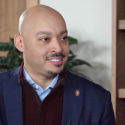Emotion, Health Symposium Enlivens the Classroom
Does anger make us sick? Are there healing powers behind optimism and humor? Do good relationships with family and friends make good medicine for the body?
These are burning questions this semester in Psychology 711, a graduate-level course at the University of Wisconsin–Madison that explores new research on emotion, social relationships and health. The field is now a flourishing research area that is helping map the connections between mind and body.
Beyond the subject matter, Psychology 711 is as unique a class as any you’ll find in higher education. The course is organized around a national symposium on emotion that will be held May 2-3 on campus, bringing together some of the top researchers in the field — the same people whose work students have studied for 15 weeks.
Rather than idle observers, the students will become direct participants in the conference.
“This is the most fun class I’ve ever taught,” says psychologist Carol Ryff, who organized the third annual conference. “It is an incredibly unique opportunity for students to study the current work of top researchers, then meet and interact with them at the end of the semester.”
During the semester, each of the course’s 15 students leads a 45-minute presentation on the research of one of the presenters. At the symposium, those students will lead question-and-answer sections on that research.
Students also write a critical review of the research and propose new research directions in the field. Those writings will be part of a bound volume published after the symposium.
“This approach raises the stakes in the classroom,” Ryff says. “Knowing you will meet these people and socialize with them is motivation to really get on top of the material.”
The annual symposia began in 1995 to highlight UW–Madison’s prominence in research on emotion and health. The National Institutes of Health (NIH) established a national Center for Behavioral Science Research here in 1993 with a $3 million grant.
Students in the class come from eight academic departments, underscoring the wide reach of this research. Departments include psychology, sociology, nursing, continuing education and kinesiology.
Meg Wise, a graduate student in continuing education, says she was impressed with the wide variety of disciplines the class covers. “Having the symposium looming at the end helps us focus our energies, and bring all the information back to a single theme,” she says. “The class showed that a broad approach to science can still be focused.”
Ted Robles, one of the class’s two undergraduates, says he is intrigued by the newness of the field, which made the course material relevant and current. The field itself, he says, is moving from “folk wisdom” to research that is proving emotion and health connections. “We’re showing the science behind this,” he says.
The conference will feature six researchers from other universities, as well as Ryff and Christopher Coe from the UW–Madison psychology department. Research topics include a study of how emotional support groups impact the health of breast cancer patients; how the parent-child relationship can influence the health of both parties; and how stress during vulnerable points in life can weaken the immune system.
The event will be held in the Lakeshore Room of the Wisconsin Center, 702 Langdon Street, and is open to the public. For more information, contact Kay Smith at (608) 262-1818.
Tags: learning



